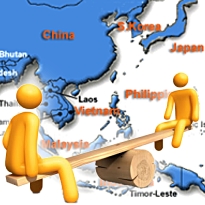 The overall Asian gambling market is nearing a tipping point similar to the one that turned Macau into the world’s number one gambling jurisdiction over the past decade. Credit Suisse Director for Non-Japan Asia Gaming and Lodging Gabriel Chan told Rappler.com there’s no one-size-fits-all macroeconomic model to predict exactly when such a tipping point is reached, but in Macau’s case, Chan says it was the aftermath of the global financial crisis of 2008. “We saw the robust growth in the luxury retail sector. We saw all the luxury brands opening shops in China. At the same time, Macau grew very fast [as part of] that.”
The overall Asian gambling market is nearing a tipping point similar to the one that turned Macau into the world’s number one gambling jurisdiction over the past decade. Credit Suisse Director for Non-Japan Asia Gaming and Lodging Gabriel Chan told Rappler.com there’s no one-size-fits-all macroeconomic model to predict exactly when such a tipping point is reached, but in Macau’s case, Chan says it was the aftermath of the global financial crisis of 2008. “We saw the robust growth in the luxury retail sector. We saw all the luxury brands opening shops in China. At the same time, Macau grew very fast [as part of] that.”
At the Asian Development Bank (ADB) annual meeting in Manila on Wednesday, it was estimated that China’s middle class would increase from its current 16% of the population to 83% by 2030. Over the same period, the middle class in countries belonging to the Association of South East Asian Nations (ASEAN) will grow from 24% to 65%. In India, the rise will be even more dramatic, from 5% to 68%. On average, wages in all three regions will rise threefold by 2030 and will comprise half the world’s middle class population. And as incomes rise in countries with strong gambling cultures, so will the interest in trying one’s luck at a local (or online) casino.
In the nearer term, Chan is predicting 25% year on year growth in Macau this year and 15% in Singapore. Chan also has high hopes for gaming growth in the Philippines, touting its affordability and lower traveling costs. Echoing this last point, Tina Garcia, the head of Investor Relations for Travellers International Hotel Group (one of the four companies building casinos in Pagcor’s Entertainment City Manila project) said everything was relative. The region’s mid-level gamblers “may be small fish in Macau, but they are super high rollers here.”
But hey, don’t forget about Taiwan. A referendum is to be held July 7 to determine whether the residents of Lienchiang County (aka the Matsu islands) want to “establish a vacation district with a tourist casino attached.” A similar referendum was planned for last year, but protests by anti-gambling groups prompted the government to postpone the decision until after elections this January. With the KMT party having maintained its grip on the levers of power, the pressure in Matsu now stems from the desire to beat competing interests in the Kinmen and Penghu island groups.
Local official Yang Sui-sheng is staunchly behind the casino construction, hoping it will bring badly-needed infrastructure to the largely undeveloped region. “Without transportation there is no tourism; without gaming there is no transportation. With lots of people comes lots of money.” Citing local sources, Gambling Compliance says the county government is backing a resort casino bid by Weidner Resorts, led by former Las Vegas Sands president/COO William Weidner. But the Ministry of Transportation and Communications is still revising a draft law covering the operations of offshore casinos, and the Ministry currently lacks the ability to adequately address money laundering concerns at the proposed casinos. All of which means, even if Matsu returns a ‘yes’ vote on July 7, there’s still a long road to slog before any casino firm breaks ground.